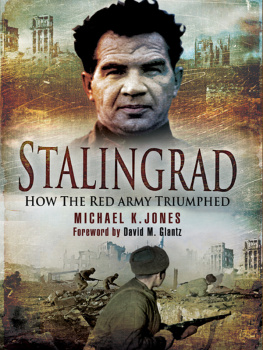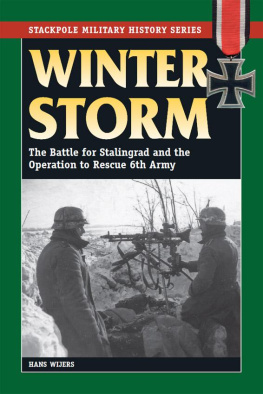THE BATTLE OF STALINGRAD
KEY INFORMATION
When: 23rd August 1942 2nd February 1943
Where: At Stalingrad (now Volgograd, Russia)
Context: World War II (1939-1945)
Belligerents: The Soviet Union against the Third Reich
Commanders and leaders:
Friedrich Wilhelm Ernst Paulus, German Marshal (1890-1957)
Vasily Ivanovich Chuikov, Russian General (1900-1982)
Outcome: Russian victory
Victims:
Russian camp: approximately 500,000 dead or missing civilians and soldiers
German camp: approximately 150,000 dead or missing and more than 110,000 taken prisoner
INTRODUCTION
A turning point of the Second World War, the Battle of Stalingrad introduced a new form of confrontation: close combat in urban areas.
In the summer of 1942, the goal of the German leader Adolf Hitler (1889-1945) on the Eastern Front was to capture the Caucasus and its oil in order to deliver a fatal blow to the Soviet economy. Starting from the Kharkov region (in eastern Ukraine), the German troops were divided in two: the first armed group headed south, to the Caucasus and its oil fields, while the 6th army of General Friedrich Wilhelm Ernst Paulus went to Stalingrad, situated along the Volga (Russian river).
Although fighting first broke out on 17th July in the citys surrounding areas, the attack did not actually begin until 23rd August 1942. Through this initiative, Adolf Hitler aimed to protect the northern flank of the troops advancing towards the Caucasus, cut the Russian communication lines and ultimately use them to head back towards Moscow.
The citys name quickly became a symbol and the scene of a fierce battle between the Germans and the Russians. The street fights that ensued there took place on an unprecedented scale and the battle was slowly becoming a personal matter for the Fhrer, who insisted on continuing the offensive.
In a ruined city, under the command of General Vasily Ivanovich Chuikov, the Red Army managed to resist and encircle the 6th German army, which surrendered in February 1943. For the first time since the beginning of the war, the German troops had been defeated and were forced to capitulate.
POLITICAL AND SOCIAL CONTEXT
THE ORIGINS OF THE CONFLICT
The Second World War began on 1st September 1939 with the invasion of Poland by the German army, forcing Britain and France, the guarantor countries of Polish independence, to mobilize against Germany. The German leader faced these two countries on the Western Front, without being attacked from behind, thanks to the non-aggression pact that had been concluded with the main power in the east, the USSR, which participated in the Polish defeat in September 1939.
Signed in August of the same year, the pact known as the Molotov-Ribbentrop Pact, named after the German and Soviet ministers of foreign affairs at the time, was based on a common desire for the destruction of the Polish state. Organizing the dismemberment of the country after its defeat, the agreement also defined the areas of German and Soviet influence in Eastern Europe.
As for Britain and France, they were powerless against these attacks governed by new military tactics: Blitzkrieg, or lightning war.
G OOD TO KNOW
The watchword of Blitzkrieg means to move forward as quickly as possible into enemy terrain using a motorized army and to carry out an extensive encirclement of enemy troops for a quick victory. With the unfailing support of the Luftwaffe (German air force), this method ensured the success of the German army until the summer of 1942.
Thanks to this new method of attack, the German troops won many victories in the first year of the war, so much so that in the spring of 1941, the majority of Europe was under its domination. Britain remained the only country on the continent that was fully able to continue fighting against it. Although the British did not have the slightest chance of emerging victorious, they refused all peace offers, making the Fhrer believe that they carried on resisting because they hoped for the intervention of a European ally. With the continent almost entirely under his control, Hitler deduced that this ally could only have been the Soviet Union. The defeat of the British Empire was therefore only possible after a defeat of the USSR, according to the Fhrers logic.
This reason was accompanied by an economic factor. The German Empire that Adolf Hitler was building through his policies of conquest and annexation had to be autonomous in terms of food and raw materials. Consequently, in order to achieve this, he had to acquire large territories, which were abundant in the Soviet Union. It therefore seemed necessary to invade the USSR by opening a new front in the east.
THE INVASION OF THE SOVIET UNION
More than just a surprise attack, the German invasion of the Soviet Union was primarily a dramatic turnaround of alliances. Before launching the hostilities, Germany ensured new secret coalitions with Finland, Hungary, Romania and Italy in order to gain their support and on 22nd June 1941, Operation Barbarossa was launched. More than five million people two thirds of the German forces participated in the state attack. The attack aimed to be quick and decisive and to defeat the Soviet Union in just four months.
However, in December 1941, after taking control of the Baltic States, Belarus and most of Ukraine, the German troops failed when they reached the gates of Moscow. Despite the appalling losses suffered by the Red Army, the Soviet troops managed to strike back. The Germans were forced to retreat, sometimes by more than 250 kilometers, but they managed to maintain strategic positions that the Russians simply bypassed.
THE SOVIET UNION ON THE BRINK
The German occupation of almost half of the Soviet European territories or the richest and most populated part of Russia plunged the state into crisis and involved serious consequences for the economy. Between 1941 and 1942:
Its workforce fell from 87 million to 55 million inhabitants;
Its grain production fell from 95 to 30 million tons;
Its motor vehicle production was reduced by two thirds.
The Red Army, severely undermined by the German invasion, painfully tried to rebuild itself. However, with the move of more than 2000 factories that were now out of reach for the Germans, production was able to gradually recommence.
Despite this, Joseph Stalin (1878-1953) decided to attack from May 1942. Still motivated by the success of the counter-attack in December 1941, the Soviet leader primarily sought to harass the German army to prevent it from recovering its strength. A series of attacks was then organized along the front to consolidate the successes gained, at the cost of many lives, during the previous winter. But these attacks, which were ill-prepared, quickly led to new defeats in the Soviet camp, the most spectacular of which was the Battle of Kharkov (12th May 1942), where hundreds of thousands of Russian soldiers were taken prisoner. Learning from this new disaster, Joseph Stalin decided to authorize the retreat of his troops and to not execute the defeated generals as he had done before. This realization would prove beneficial to the fighting that would soon take place in the Caucasus.












